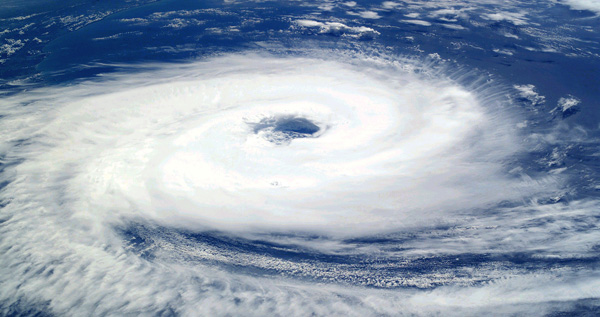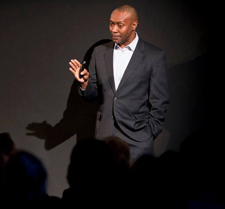
Editor’s note: A recent tweet from Pat Sajak, host of the American gameshow Wheel of Fortune, has stirred up a great deal of attention regarding celebrities, soapboxes and scientific subjects (climate change, in this case). In many instances, this attention has taken the form of people in the science community rolling their eyes or making sarcastic remarks. But Marshall Shepherd, former president of the American Meteorological Society and director of the Atmospheric Sciences Program at the University of Georgia, is using Sajak’s tweet as the starting point for a smart discussion about the way we talk about climate change. Shepherd’s post originally ran May 21 on his personal blog, and I am re-posting it with permission.
I want to use the recent Pat Sajak tweet to turn a negative to a positive. I don’t know Mr. Sajak so will not judge him, his intent, or ideological perspective. Instead, I will draw out three things that can help advance the discourse on climate science.
First, it is imperative for the public to recognize that this “minor” incident highlights a “major” problem. All kinds of people with virtually no expertise are comfortable speaking on climate science.

I can be in the grocery store and if someone finds out that I am a meteorologist-climatologist type, they often feel comfortable telling me “the climate changes naturally” or launching into some zombie theory (i.e. a theory that I have heard a million times and has been disproven by the science). I am usually cordial, but in the back of my mind, I am thinking: “Really? You think the director of a major university’s atmospheric sciences program (Go Dawgs) with a BS, MS, and PhD in meteorology from a top program (Go Noles) doesn’t know that the climate changes naturally?”
I often wonder if nuclear engineers experience people walking up to them in the mall suggesting new reactor cooling techniques. But I digress.
Meteorology is rooted in fluid dynamics, thermodynamics, and other complex mathematics-physics principles. It has been rated, many times, as one of the most difficult majors on a college campus. I often have students coming to my program wanting to study weather or climate because they “love clouds or tornadoes,” yet when I lay out the math, physics, and other requirements, they have a “deer-in-headlights” look. (Click here for more information on the credentials required to be a meteorologist.) I think even this curriculum could be augmented, because many programs are very limited in coursework related to climate modeling, paleoclimate studies, advanced time series analysis, and advanced statistical methods.
The lesson here is that you must consume information from credible or expert sources. Ask yourself if the author of that blog or Op-Ed has a background in the science, has published in peer-reviewed journals, or at least put forth their position in a forum that can be evaluated, tested, or scrutinized. Additionally, it is important to remember that just because people have “equal access” to experts in formats like Twitter, it doesn’t mean “equal expertise.” My 7 year old could tweet his view on the onset of El Niño, but it doesn’t mean it is credible.
Second, the public must understand that just because you know a TV personality, it doesn’t signify that they are an expert on climate or vaccines. While this may sound trivial, many celebrities reach millions of people, and I am convinced that some fall into lock step with celebrity viewpoints just because they like them or their show. Likewise, it is important to remember that “weather is your mood, climate is your personality.” Expertise in day-to-day weather forecasting is not necessarily expertise in climate analysis, modeling, and processes.
Every now and then, I get the question, “So how can we trust a climate model in the year 2040, if a weather model is not good beyond 7-10 days?” That question immediately tells me there is a gap in background because climate models are not predicting the exact state of the atmosphere (weather) on Wednesday in 2040. It is an apples and oranges discussion. More disturbingly, I have received that question from a few people that reach the public every day.
Having said that, there are a ton of outstanding colleagues in the broadcast world that do an amazing job with weather and climate.
Finally, irrespective of viewpoint, the name-calling and bullying must stop. We are not 5th graders. Scientists are trained to disagree and have scientific discourse without taking it personally. There are colleagues that I fundamentally disagree with on aspects of this issue, yet I still respect them and interact with them in a professional, social and respectful manner.
“Unpatriotic racists?” I clearly serve my country and have yet to figure out how to discriminate against myself or anyone else. I am an African-American scientist. I am the immediate Past President of the largest professional society in this country associated with weather and climate (AMS). I served on a Pentagon-commissioned study on climate and national security. I was a NASA scientist for 12 years. I currently serve on advisory boards for NOAA and NASA.
Meanwhile, I am curious to see if I can use the “Wheel” to teach anything about vorticity, force, or shear in a future meteorology class.

You know it was a joke, right? Pat Sajak’s twitter feed is a bizarre and often pretty funny stream of deadpan jokes most public figures wouldn’t touch with a ten-foot pole, like this: https://twitter.com/patsajak/status/466247869788205056
In this case, he was fed up with “the name-calling directed at climate skeptics” (direct quote from Sajak) and decided to parody it. Of course, if a bunch of REAL climate-change deniers took it seriously and retweeted it thousands of times, that’s even funnier.
LikeLike
Sometimes jokes blow up, especially when the intended parody turns into something insulting.
Sajak should have at least acknowledge that people were offended, but his follow up was another dig.
I had no idea of Sajak’s judgement, politics, or character before this. Now I think poorly of him on all counts.
This is the result for me: I have enjoyed Wheel of Fortune in the past, but from now on I will see a snarky, ill-informed, ideological host instead of a light-hearted one. I’ll be inclined to turn off the TV when Wheel comes on–or maybe I should just focus on Vanna White, who is there as eye-candy.
LikeLike
Climate change, like politics and most discussion topics of our day, has gotten far too divisive because we’ve allowed it to go there.
I also don’t take the opinion of a guy who hasn’t forecasted weather in nearly 35 years (Sajak’s LA weather days) all that seriously when it comes to climate change, just like I don’t take the opinion of Al Gore that seriously when he’s kicking all that exhaust into the air flying around the country, nor do I take the opinion of any hard partisan on the subject seriously.
If it’s a peer-reviewed scientist talking about climate, that’s great. I’ll listen.
If it’s not, it’s onto the next snarky tweet that comes down the pike.
That all said, we (Americans) get into rage mode far too often over things that are often trivial…like one’s opinion on the subject. If one isn’t able to figure out that Sajak is about as qualified to talk climate science as your cat, that’s not my problem…nor is it my place to rage about Sajak’s attempts at humor or satire or whatever you want to call it.
We take the wrong people far, far too seriously…often to our own detriment.
LikeLike
“I want to use the recent Pat Sajak tweet to turn a negative to a positive” That is a good intention, but so far there is no evidence that something good came out of it.
Marshall Shepherd’s post will be read by very few, such as readers of this blog, who are more likely to recognize real experts, with publications, research record etc. The public at large cannot easily distinguish real experts from fake ones. That’s why certain ads work, which conclude “I am not a real doctor, but I play one on TV.’
Any claim that is repeated enough, no matter how wrong, will set up most people to believe it, as ‘everyone says…’ or at least spread doubt, such as ‘ ..experts are divided…?’
It is enough for the climate change deniers to spread ‘fear, uncertainty and doubt’ (‘FUD’), which is achieved by just repeating their claims; and skillfully exploiting American journalism’s penchant for
‘balance.’ (if someone says ‘the earth is flat’ you’ll read in the paper, ‘Opinions on the shape of the earth differ’ on the front page, and on p.A23, Prof. xxx of the yyy Institute of Geoscience refuted this view, but agreed that it had a long history.) How often have you heard, even on the presumably liberal NPR, a real (academic) expert opposed by a lobbyist, though one with a PhD. (in business, not in the matter discussed) with additional credentials as ‘fellow of [famous political think tank],’ and if you don’t pay attention, you think it is a discussion between two equal experts.
The spread of ‘FUD’ is enough to prevent any action, and that is all the climate change deniers want.
(in the same way, wide recognition that smoking causes cancer was successfully delayed, allowing a few
more profitable years for tobacco companies)
Re: “the name-calling and bullying must stop.” Of course, it is important to be polite, but one has to be absolutely clear and direct, when talking to the public. As academics we are trained to qualify our remarks, to be open to new information etc., which unfortunately is interpreted by the public as insecurity, and makes the absolutely certain lobbyist look good, and encourage uncertainty and doubt.
LikeLike
Pingback: [BLOCKED BY STBV] Scientist: Just because someone’s on TV doesn’t mean they’re an expert | Scope Blog